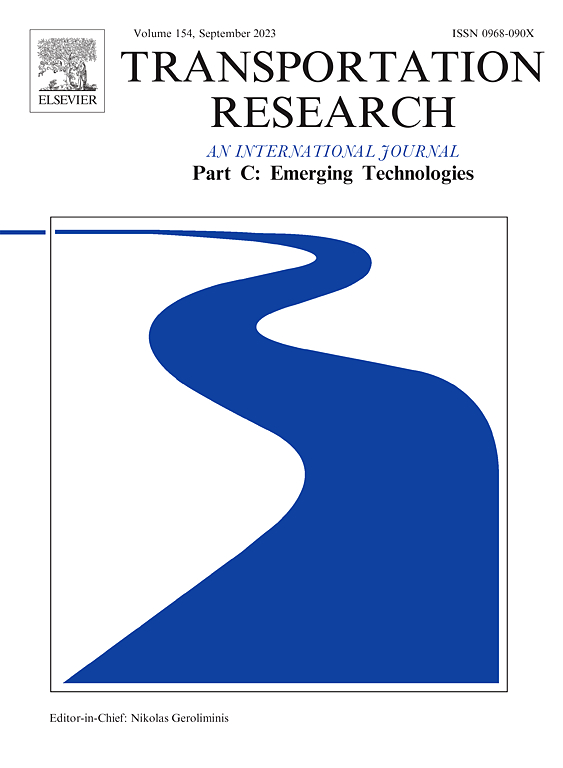Reducing the blocking effect in the airport slot allocation problem with seasonal flexibility
IF 7.6
1区 工程技术
Q1 TRANSPORTATION SCIENCE & TECHNOLOGY
Transportation Research Part C-Emerging Technologies
Pub Date : 2024-11-22
DOI:10.1016/j.trc.2024.104917
引用次数: 0
Abstract
Capacity limitations, combined with increased air-traffic, continue to drive the need for better resource management at airports. At congested airports, the allocation of resources for flights to take-off and land is governed through the use of slots. Slots are allocated twice a year according to the Worldwide Airport Slot Guidelines (WASG). A principle of WASG is to allocate slots to a request at the same time and day of the week over a given period, to maintain regularity in a schedule. Adhering to this principle can result in blocking, where requests are displaced to an alternative time period due to lack of available capacity. This paper addresses blocking by allowing a request to be allocated to slightly different times on different operating days. We present a novel integer linear programming (ILP) model and develop a two-stage framework, incorporating the Late Acceptance Hill Climbing metaheuristic, to increase flexibility across a complete scheduling season to mitigate the effect of blocking on three real-world congested airport instances. Results show that exact methods are not tractable for larger problems, as they are unable to find a solution in reasonable computational time, resulting in the need for heuristic methods to solve such problems in practice. Schedules created using the proposed framework are directly compared to an existing state-of-the-art model which aims to mitigate the effect of blocking through seasonal segmentation. The proposed approach is demonstrated to be able to reduce the effect of blocking, reduce the total number of displaced requests, and the maximum displacement within slot schedules when compared with non-flexible schedules.
减少具有季节灵活性的机场机位分配问题中的阻塞效应
机场容量的限制,加上航空交通量的增加,继续促使机场需要更好的资源管理。在拥挤的机场,航班起降的资源分配是通过使用时段来管理的。根据《全球机场机位指南》(WASG),机位每年分配两次。WASG 的一项原则是在一定时期内每周的同一时间和同一天为某项申请分配时段,以保持航班时刻表的规律性。遵守这一原则可能会导致阻塞,即由于可用容量不足,请求被移至其他时段。本文通过允许将请求分配到不同工作日的稍有不同的时间段来解决阻塞问题。我们提出了一个新颖的整数线性规划(ILP)模型,并开发了一个两阶段框架,其中结合了 "晚期接受爬坡 "元启发式,以提高整个调度季节的灵活性,从而减轻堵塞对三个现实世界拥堵机场实例的影响。结果表明,精确方法无法在合理的计算时间内找到解决较大问题的方法,因此在实践中需要采用启发式方法来解决此类问题。使用建议的框架创建的时间表与现有的最先进模型进行了直接比较,后者旨在通过季节性分割来减轻阻塞的影响。结果表明,与非灵活计划相比,所提出的方法能够减少阻塞效应、减少被移除请求的总数以及时隙计划内的最大移除量。
本文章由计算机程序翻译,如有差异,请以英文原文为准。
求助全文
约1分钟内获得全文
求助全文
来源期刊
CiteScore
15.80
自引率
12.00%
发文量
332
审稿时长
64 days
期刊介绍:
Transportation Research: Part C (TR_C) is dedicated to showcasing high-quality, scholarly research that delves into the development, applications, and implications of transportation systems and emerging technologies. Our focus lies not solely on individual technologies, but rather on their broader implications for the planning, design, operation, control, maintenance, and rehabilitation of transportation systems, services, and components. In essence, the intellectual core of the journal revolves around the transportation aspect rather than the technology itself. We actively encourage the integration of quantitative methods from diverse fields such as operations research, control systems, complex networks, computer science, and artificial intelligence. Join us in exploring the intersection of transportation systems and emerging technologies to drive innovation and progress in the field.

 求助内容:
求助内容: 应助结果提醒方式:
应助结果提醒方式:


